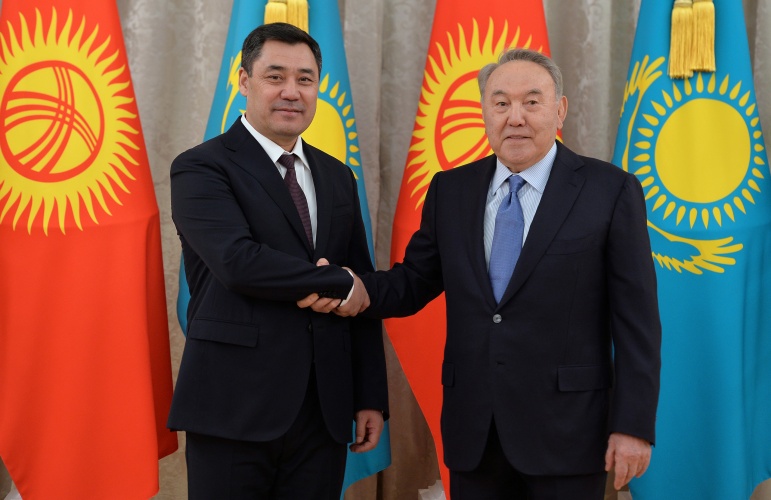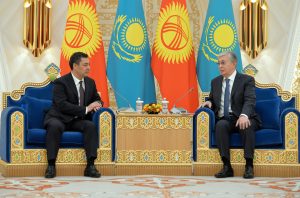Kyrgyz President Sadyr Japarov traveled to Kazakhstan on Tuesday for a two-day state visit, his second trip abroad as president after a late February working visit to Russia.
Japarov met with Kazakh President Kassym-Jomart Tokayev, signing a bevy of documents and issuing a joint statement; he also met with First President Nursultan Nazarbayev, Prime Minister Askar Mamin, and Chair of the Mazhilis (the lower house of parliament) Nurlan Nigmatulin.
The joint statement conveyed a sense of normalcy, with the two sides discussing strengthening their strategic partnership and alliance and touching on a number of bilateral and relevant multilateral efforts. “Elbasy” — Leader of the Nation, Nazarbayev — was lauded early in the statement, highlighting his continued strong influence in Kazakhstan’s domestic and international relations. The statement emphasized the necessity of expanding business and economic ties across a range of sectors. The Eurasian Economic Union, which Kazakhstan holds the rotating chairmanship of, also made an appearance.
After nearly 30 years of independence, Kazakhstan and Kyrgyzstan are still aiming to “unleash the potential of cross-border cooperation.”
In addition to the joint statement, the two presidents oversaw the signing of at least seven documents. The Kyrgyz president’s website outlines the agreements as follows: an agreement on the provision of “gratuitous” military-technical assistance (presumably from Kazakhstan to Kyrgyzstan); an agreement between the two countries’ culture ministries on development of national sports and folk games; plans for cooperation between the two countries’ defense ministries in 2021; a program of cooperation for the foreign ministries in 2021-2022; a plan for joint activities between the Kyrgyz State Inspectorate for Environmental and Technical Safety and the Kazakh Ministry of Trade and Integration; a memorandum of understanding between the Kyrgy State Service for Digital Development and the Kazakh Ministry of Digital Development, Innovation, and Aerospace Industry; and a protocol on the exchange of electricity signed between the Kyrgyz Minister of Energy and Industry and the Kazakh Ministers of Energy and of Ecology, Geology, and Natural Resources.
Barring the details of the agreements, on the surface they seem to be a fairly typical portfolio.
As Kubat Kasymbekov, a journalist with RFE/RL’s Kyrgyz Service, noted in his analysis of the visit, despite being neighbors and deep historical ties Kazakhstan and Kyrgyzstan have not always had an ideal relationship.
Kazakhstan’s economy outstrips Kyrgyzstan’s, with the former boasting a GDP of $181.7 billion in 2019 and the latter just $8.46 billion. Where Kazakhstan is rich with resources like oil and gas, Kyrgyzstan is much less so. Kazakhstan is Kyrgyzstan’s third largest trade partner, after China and Russia, and the country stands as a major destination, after Russia, of Kyrgyz labor migrants.
Kyrgyzstan’s routine political upheavals (revolutions in 2005 and 2010, then the events of 2020 that brought Japarov to power) contrast sharply with Kazakhstan’s autocratic political stability.
That reality was highlighted by yet another Kyrgyz president meeting with Nazarbayev, which Japarov did after his meeting with Tokayev. On Twitter, Kasymbekov noted that Japarov is the sixth Kyrgyz leader to meet with Nazarbayev in the last 30 years, attaching an image of the Kazakh president with each of his Kyrgyz counterparts.

Sadyr Japarov shakes hands with Nursultan Nazarbayev in Nur-Sultan Kazakhstan. Photo: Kyrgyzstan Presidency Press Office
In some ways, the tumultuous nature of Kyrgyz politics provides a perfect foil for the Kazakh leadership, who can point south and push back against those demanding more rapid progress toward something closer to genuine democracy. At the same time, Kyrgyzstan seems to be on a carousel of sorts, cycling through different presidents via various irregular transitions but not quite making the progress it hopes to in democratic or development terms.
Arguably the greatest break in relations between Kazakhstan and Kyrgyzstan occurred in 2017, when outgoing Kyrgyz President Almazbek Atambayev — seldom one to moderate his speech for the sake of diplomacy — accused Kazakhstan of meddling in Kyrgyzstan’s election. Nazarbayev had met with Omurbek Babanov, a Kyrgyz politician viewed at the time as a top challenger to Atambayev’s preferred successor (and eventual victor) Sooronbay Jeenbekov. Shortly thereafter, problems arose at the Kazakh-Kyrgyz border and lines of trucks bearing perishable goods became the victims of a diplomatic spat. Atambayev didn’t back down, calling it a blockade and delivering this prime tirade in mid-November 2017:
In spring 2014, at the whim of a similar aged dictator in another neighboring republic, our southern regions were cut off from natural gas. I remember how our political wirepullers, our lawmakers shouted then saying that Atambayev must go and bend to the aged dictator… Some people seem to say that Atambayev must bend his knees in front of the rich neighbor and apologize…. It is not Atambayev but those who impertinently meddle in our affairs who must apologize; those who wanted to put their flunky on the chair of the sovereign Kyrgyzstan’s president… Yes, their flunky will sit. However, not on the presidential chair but in a prison cell.
The “aged dictator” referenced was Uzbekistan’s Islam Karimov and the “rich neighbor” Nazarbayev.
The high-level spat petered out when Jeenebkov took office and made a trip to Kazakhstan in December that year. The border nevertheless remained an occasional pain, even more so when the coronavirus sparked lockdowns on both sides of the border.
More than the documents signed, the core purpose of Japarov’s visit was to make the personal connections that form the lifeblood of Central Asian interstate relations.













